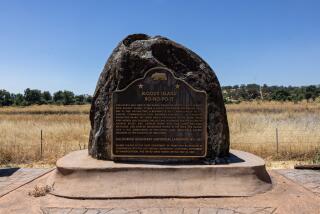Florida high school to remove name of early KKK leader
A Florida high school that was named in the 1950s after a 19th century white supremacist and now has a majority black student enrollment will soon have a new name for its 21st century community.
Nathan Bedford Forrest High School in Jacksonville will change its name in time for the new school year in August, school officials decided Monday. Forrest was a famous Confederate general and the first grand wizard of the Ku Klux Klan, though he later distanced himself from that organization with its history of racial lynching, cross burnings and other violent acts.
“My vote tonight does not reflect judgment of a man,” said school board member Ashley Smith Juarez, who supported the change. “I am not called to judge. My vote tonight honors the voice of students.”
A school district survey showed that 64% of the 1,035 students who responded wanted a change; 36% were opposed. Of the 93 community respondents, 75% wanted the name to remain the same. Of the 339 alumni who responded, 6% supported a name change while 94% opposed it.
The school superintendent will present a new name to the school board and community in January.
“It is clear that the Nathan B. Forrest name represents disparate views that have led to a cloud of divisiveness that we have had an opportunity to address and remove today,” Supt. Nikolai Vitti said at the Duval County School Board meeting Monday. “I am convinced that my recommendation and the board’s decision will move Jacksonville and the school district forward and allow us to focus on what matters most — student achievement.”
The name change in Florida is part of the ongoing reevaluation of attitudes across the South and the nation as communities try to come to grips with an often racist heritage — once comfortable for the majority but increasingly ill fit in modern, multicultural times.
Sports teams, for example, have been requested by many to drop nicknames that trivialize and demean racial and ethnic groups. That battle has reached all the way to Washington and its NFL team, the Redskins.
For the South, this can mean dealing with revered war heroes who fought for the Confederacy in the Civil War.
In Memphis, Tenn., the City Council voted in February to change a park’s name from Nathan Bedford Forrest Park to Health Sciences Park, though a statue of Forrest on a horse remains. It also voted to rename Confederate Park as Memphis Park and Jefferson Davis Park as Mississippi River Park.
In Lee County, Fla., the National Assn. for the Advancement of Colored People has been lobbying for years to change the county’s name because it honors Gen. Robert E. Lee, the commander of the Confederate army. Florida officials have refused the request.
The school name change in Jacksonville has been fought for years. A previous attempt to change the name was struck down by the school board in 2007.
Forrest High opened in the 1950s and, as was common in much of the South, was all white. The United Daughters of the Confederacy, a community group including descendants of Southern veterans of the Civil War, suggested the name as a protest against the growing desire to end the official policy of racial discrimination known as Jim Crow.
Born in Tennessee, Forrest was a strong symbol of the old South. He was a slave trader who enlisted in the Confederate army, rising to general in about a year. Some histories said that Forrest was responsible for a massacre of black prisoners after a victory at Tennessee’s Ft. Pillow in 1864, though those claims are in dispute.
In 1867, the newly formed Klan elected Forrest its honorary grand wizard, or national leader, but he publicly denied being involved. In 1869, he ordered the Klan to disband because of the members’ increasing violence.
It took a federal court order to desegregate Forrest High School in 1971. The school is now about 61% African American. More than 40 years later, the issue of changing the school’s name still divides the community.
“He should be relinquished to history,” said a participant at Monday night’s special school board meeting, according to a television recording of the proceedings. “To fade away out of the memory of man forever.”
The current move for eliminating the name was pushed by Omotayo Richmond, who started a petition on the website change.org, where he collected more than 160,000 signatures.
“I’m really glad that we had the opportunity to smash some old paradigm of hate and racism here in Jacksonville,” Richmond told reporters after the vote. “This city is too beautiful for that blemish to be on it.”
More to Read
Sign up for Essential California
The most important California stories and recommendations in your inbox every morning.
You may occasionally receive promotional content from the Los Angeles Times.











